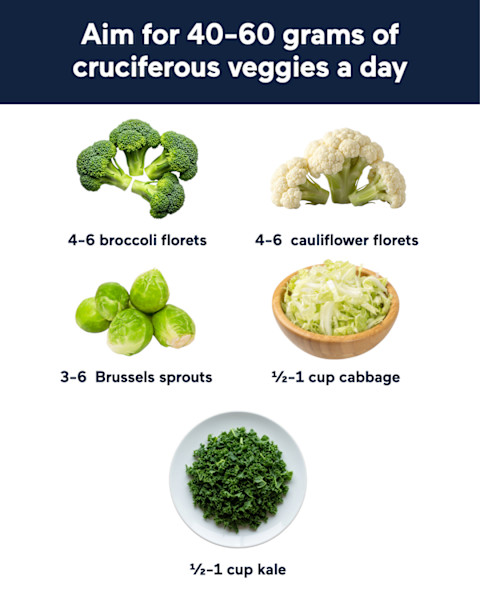Eating More Cruciferous Vegetables Can Cut Colon Cancer Risk by 20%, Study Shows
Colon cancer is the third most diagnosed cancer worldwide and the second leading cause of cancer death. Diagnoses are also rising among people who are under 50 years of age due to the link between lifestyle and environmental factors linked to the disease.
While this is concerning, it also means that there are actionable steps we can take to lower our risk, and what we eat is one of the most powerful tools in doing so.
A new, massive study recently investigated how cruciferous vegetable intake influences disease risk. And results show you don’t have to eat piles and piles of kale to see a positive effect on health. Let’s break it down.
About the study
Researchers pooled data from 17 studies (including 98,000+ people) examining cruciferous vegetable intake and colon cancer risk.
Cruciferous veggies—like broccoli, cauliflower, cabbage, Brussels sprouts, kale, arugula, and watercress—are nutrient-dense foods. They're rich in fiber, vitamin C, carotenoids, and flavonoids. But they’re most known for their glucosinolate content.
Glucosinolates are sulfur-containing compounds. When you chop, chew, or digest these vegetables, an enzyme called myrosinase breaks glucosinolates down into their active compounds—most notably isothiocyanates (like sulforaphane) and indoles (like indole-3-carbinol).
And previous research shows that isothiocyanates and indoles have anti-cancer properties.
Sure enough, this new review found that these compounds really do have a protective effect
Cruciferous vegetables protect against colon cancer
Results show that eating more cruciferous vegetables was tied to a lower risk of colon cancer (this was true in both Asian and North American populations).
In fact, researchers found that higher cruciferous veggie intake slashed colon cancer risk by an impressive 20%.
But what does this higher intake really mean? Risk reduction was highest (and seemed to plateau) at eating around 40 to 60 grams of cruciferous veggies daily, which is equal to ½-1 serving.
For further context, that’s about 4-6 small broccoli or cauliflower florets, 3-6 Brussels sprouts, or ½-1 cup shredded cabbage or kale a day.
It’s truly a small dietary change that can have a big impact.

The role of glucosinolates
The authors of this review further iterate the role that glucosinolates play in this effect. These compounds help:
- Detoxify carcinogens
- Block cancer-promoting pathways
- Reactivate tumor suppressor genes
- Prompt unhealthy cells to self-destruct
Gluconisnolates are unique to cruciferous vegetables (although you can find these compounds in some supplements), so make space on your plate for them!
Other habits that lower colon cancer risk
There are other dietary habits that can also help lower your risk of colon cancer. These include:
- Increasing fiber intake: Fiber is one of the most important nutrients for our gut microbiome (which is in the colon!). Most Americans only consume about 16 grams of fiber a day, when we should be getting 25-38 grams1. Incorporating more of these high-fiber foods into each meal, or opt for a high-quality fiber supplement (like one of these expert-vetted picks) for more targeted support.
- Limit processed meats: The World Health Organization classifies processed meats (ones that have been salted, cured, or smoked) as a type 1 carcinogen2. It’s best to limit intake of processed meats like salami, pepperoni, and hot dogs.
- Watch your vitamin D intake: Studies continually show that higher vitamin D status is linked to a lower likelihood of colon cancer. Check out this list of 12 healthy foods that can help you up your vitamin D intake. We rounded up our top picks for vitamin D supplements here
The takeaway
What you eat strongly influences your risk for colon cancer, and even making small changes (like having a serving of cruciferous veggies a day) can have a big impact.
